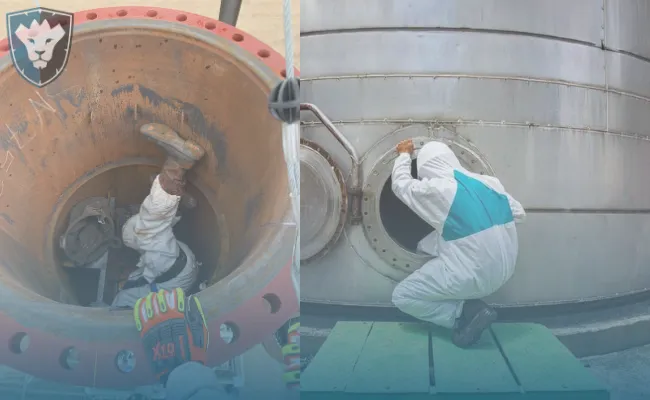
4 Crucial Reasons Every Worksite Needs a Well-Trained Confined Space Rescue Team
Confined spaces are often an essential part of industrial work environments, including oil fields, construction sites, and manufacturing facilities. However, these spaces, like maintenance tunnels and storage tanks, pose significant dangers. Workers operating in confined spaces face hazardous conditions such as limited ventilation, toxic gases, and restricted movement. In the event of an emergency, a well-trained confined space rescue team can be the difference between life and death.
While many companies understand the risks, not all implement the necessary rescue protocols or establish trained rescue teams. This blog explores four critical reasons why every company must have a well-prepared confined space rescue team on-site and why sticking to these guidelines is vital for worker safety.
1. Rescue Drills Prepare for Real Emergencies
Conducting regular rescue drills is one of the most effective ways to prepare both rescue teams and workers for confined space emergencies. When accidents happen in confined spaces, panic can set in, making it difficult for untrained personnel to think clearly. Workers who have experienced rescue drills know exactly what to expect, where to go, and how to act, minimizing confusion during a real crisis.
Why It Matters:
Prepares Workers for Real Scenarios: Rescue drills simulate emergency situations such as gas leaks, falls, or equipment malfunctions, helping workers familiarize themselves with rescue protocols.
Reduces Response Time: The more often rescue drills are conducted, the quicker a rescue team can act in a real emergency. Faster response times save lives, especially in environments with toxic gases or where oxygen levels drop rapidly.
Builds Team Confidence: Drills allow rescue teams to practice under controlled conditions, boosting their confidence in their ability to handle emergencies effectively.
Real-World Impact:
Imagine a confined space worker trapped after an unexpected gas leak. Without regular rescue drills, the team’s response could be slow or disorganized. Drills ensure that rescue operations run smoothly, reducing the likelihood of fatal errors.
By implementing routine rescue drills, your company can ensure that your workforce is prepared to handle confined space emergencies quickly and effectively. Basin Safety Consulting offers comprehensive confined space rescue training that helps companies stay ready for the worst-case scenario.
2. Identifying and Managing Confined Space Hazards
Each confined space comes with its own unique set of risks. Without a deep understanding of these hazards, rescue teams may not be able to act appropriately when emergencies occur. A well-trained confined space rescue team doesn’t just respond to emergencies—they actively survey confined spaces, identifying potential hazards before work begins.
Key Points:
Tailored Hazard Identification: No two worksites are identical. A thorough assessment of each confined space helps rescue teams adapt their approach based on the specific risks present, whether it’s toxic gases, limited oxygen, or structural weaknesses.
Pre-emptive Hazard Mitigation: Early identification of hazards allows rescue teams to address these dangers proactively, minimizing the chance of an accident.
Improved Rescue Procedures: A detailed understanding of confined space hazards enables the rescue team to plan their rescue approach ahead of time, streamlining their actions during an actual emergency.
Real-World Impact:
Consider a confined space filled with flammable gas. A poorly equipped rescue team may inadvertently cause a spark, leading to an explosion. A trained team, however, would know to use intrinsically safe equipment, preventing further disaster.
Implementing regular hazard assessments helps your team act with precision during emergencies. Basin Safety Consulting provides expert training on hazard identification and confined space rescue to ensure safety remains a priority.
3. Coordinating with First Responders
In many confined space incidents, time is of the essence. While first responders play a critical role in saving lives, they may not arrive at a remote or industrial worksite fast enough to initiate a rescue. Having an on-site, well-trained rescue team ensures that life-saving measures can begin immediately, even before outside help arrives.
Why This Coordination Matters:
Bridging the Time Gap: Confined space rescue teams can start life-saving efforts while waiting for first responders. This is critical in remote areas where rescue services may take longer to arrive.
Seamless Collaboration: Joint drills and regular communication between on-site rescue teams and external first responders ensure seamless coordination during emergencies.
Specialized Knowledge: Confined space rescue teams bring a specific set of skills and equipment that first responders may not always have. This combination of expertise is essential in difficult rescues where complex challenges, such as low oxygen or toxic gases, are present.
Real-World Impact:
Imagine a worksite in a remote area. A worker collapses due to low oxygen levels in a confined space. If first responders are 30 minutes away, that worker’s chance of survival diminishes without immediate intervention. A trained on-site rescue team can stabilize the worker and prevent a fatal outcome.
By ensuring smooth coordination with first responders, your company guarantees faster, more effective rescues. Basin Safety Consulting offers rescue team training that includes joint drills with local first responders, ensuring full preparedness.
4. Proper Use of Personal Protective Equipment (PPE)
Rescuing workers from confined spaces involves more than pulling someone out. Without the proper equipment, both the trapped worker and the rescue team could be in danger. Well-trained confined space rescue teams know how to use Personal Protective Equipment (PPE) effectively, ensuring safety during rescues.
The Role of PPE in Confined Space Rescues:
Respiratory Protection: In environments with toxic gases or low oxygen, rescue teams must wear appropriate breathing apparatuses. This protects the team while they assist trapped workers.
Fall Protection Systems: Confined spaces often involve heights or drop-offs. Proper use of fall protection systems is essential during rescues.
Rescue Equipment Expertise: Beyond basic PPE, confined space rescues require specialized gear, such as hoists and winches, to safely extract workers. Rescue teams must know how to use this equipment effectively to prevent further harm.
Real-World Impact:
Consider a confined space filled with hydrogen sulfide (H2S). Without the proper respiratory PPE, the rescue team could succumb to the same conditions that incapacitated the worker. A well-trained team knows how to protect themselves and safely rescue others using the correct equipment.
Providing your rescue team with the right tools—and training them on proper use—keeps everyone safe during confined space emergencies. Basin Safety Consulting offers in-depth PPE training as part of its comprehensive confined space rescue services.
Conclusion: Why Your Company Needs a Confined Space Rescue Team Now
Working in confined spaces is inherently dangerous, but these risks can be effectively managed with a well-trained confined space rescue team. From conducting rescue drills and hazard identification to coordinating with first responders and utilizing the proper PPE, a prepared rescue team can make all the difference in life-threatening situations.
Basin Safety Consulting is here to help your company establish these vital protocols. With expert training, hazard assessments, and collaboration drills, your team will be ready to face any confined space emergency. Don’t wait for an accident to happen—contact Basin Safety Consulting today and ensure that your worksite meets the highest standards of safety.
Contact Us: (701) 572-8140
www.basinsafetyus.com
Archives
Categories
Benzene Testing
Bloodborne Pathogens
Breathing Air Systems
Certification Process
Confined Space Attendants
Confined Spaces
Construction Equipment Operators
Electrical
Environmental Compliance
Excavation and Trenching
Fire Extinguisher Training
Forklift Operator
Hazcom Workplace Safety
HAZWOPER
Hearing Protection Training
Heavy Equipment
Hydrogen Sulfide
Lone Worker
Lone Worker Solutions App
Monitoring
Oil and Gas
Oil Drilling
Online Training Confined Spaces
Permit-required
PPE
Radiation Safety
Rescue Equipment
Rescue Team
Safety Consultants
Safety Devices
Safety Tracking
Safety Training
Site Inspections
Training 1
Training 2
Training 3
Training 4
Training 5
Uncategorized
Virtual Access to Safety Data
Waste Haulers
Confined Space Rescue
Mental Health
VISIT US
202 48th Ave SW, Williston, ND 58801
2740 Sims St. Suite B Dickinson, ND 58601
(701) 572-8140

BASIN SAFETY CONSULTING CORPORATION
Basin Safety believes in shared excellence. We are accountable to our core values:
● Pioneering Excellence Everyday
● Supporting each other to put customers first
● Asking the right questions, to ensure the greatest results.
Basin Safety Consulting © 2026. All rights reserved.
Powered By Upleveled Strategies

BASIN SAFETY CONSULTING CORPORATION
Basin Safety believes in shared excellence. We are accountable to our core values:
● Pioneering Excellence Everyday
● Supporting each other to put customers first
● Asking the right questions, to ensure the greatest results.
VISIT US
202 48th Ave SW, Williston, ND 58801
2740 Sims St. Suite B Dickinson, ND 58601
(701) 572-8140
Basin Safety Consulting © 2026. All rights reserved.
Powered By Upleveled Strategies

